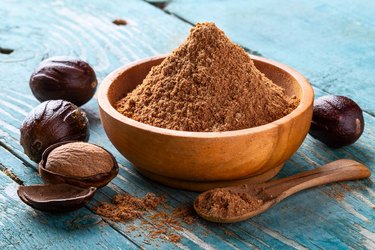
When it's sprinkled on top of holiday eggnog or folded into a curry, nutmeg adds a slightly sweet and nutty flavor that sets the recipe apart.
Native to the West Indies and Sri Lanka, the nutmeg seed — which is ground up and used as a spice — was traditionally used to treat a variety of ailments, such as toothache, joint pain, anxiety, depression, chronic diarrhea and other gastric disorders, per December 2016 research in Phytochemistry Reviews.
Video of the Day
Video of the Day
While it's not proven that the spice can actually help with these everyday ailments, research has shown that eating too much nutmeg can come with some dangerous side effects.
The Side Effects of Too Much Nutmeg
Nutmeg is safe in small amounts — after all, most recipes call for 1/4 to 1/2 a teaspoon of the spice for the entire recipe. And if you're not eating the whole dish in one sitting, you're taking in even less nutmeg.
But taking in too much nutmeg can be toxic. A single tablespoon of ground nutmeg can cause mild symptoms, and 2 to 3 tablespoons or more can cause the more severe side effects, according to a June 2014 review in the Journal of Medical Toxicology.
According to the Tennessee Poison Center, some of the unpleasant side effects of too much nutmeg include:
- Dizziness
- Drowsiness
- Headache
- Nausea
- Vomiting
- Dry mouth
- Skin flushing
- High blood pressure
- Heart arrhythmia
- Visual hallucinations
- Hostile behavior
- Anxiety
- Psychotic episodes
- Dissociation
- Seizures
- Death (although rare, a few cases have been reported)
What Is a 'Nutmeg High' — and Why Is It Dangerous?
A 2- or 3-tablespoon dose of nutmeg may cause visual hallucinations or a feeling of being "high."
That's due to two compounds in the spice — myristicin and elemicin — which are responsible for the psychological and physiological effects, per the Tennessee Poison Center.
These effects typically set in between 3 and 8 hours after taking a high dosage, but getting high on nutmeg is a relatively rare occurrence and myristicin poisoning can be very dangerous.
But, taking that much is pretty unpalatable, making getting accidentally high on nutmeg a relatively rare (yet dangerous) occurrence.
Warning
Do not use nutmeg recreationally to get high — there are serious risks associated with taking too much nutmeg, including seizures, heart issues and even death.
If you swallow an unusual amount of nutmeg, or if you suspect nutmeg poisoning in someone you know, call your local Poison Information Center for help.
- McCormick: "Nutmeg, Ground"
- Tennessee Poison Center: "How Much Nutmeg Should You Add to Your Eggnog to Treat the Post-Holiday Blues?"
- Academia: "Mosby's Handbook of Herbs and Natural Supplements"
- Science Direct: "Nutmeg"
- U.S. National Library of Medicine PubChem: "Safrole"
- Phytochemistry Reviews: Chemical diversity and pharmacological significance of the secondary metabolites of nutmeg
- Journal of Medical Toxicology: Nutmeg Poisonings: A Retrospective Review of 10 Years Experience from the Illinois Poison Center, 2001–2011